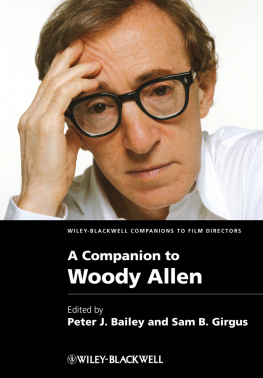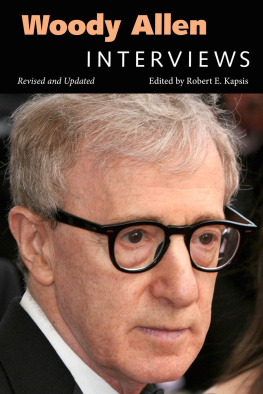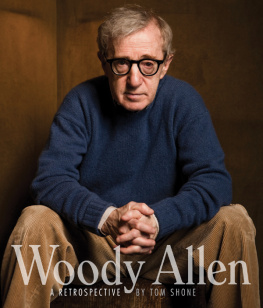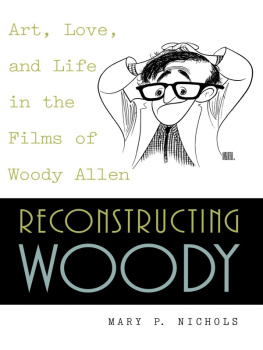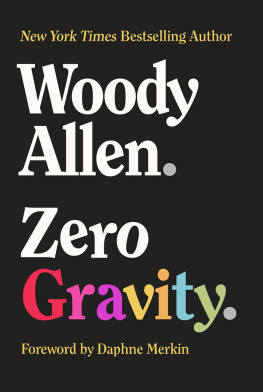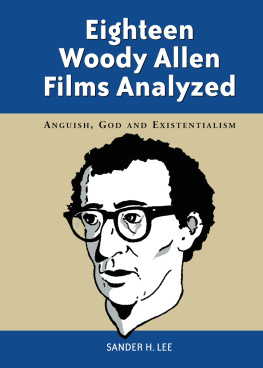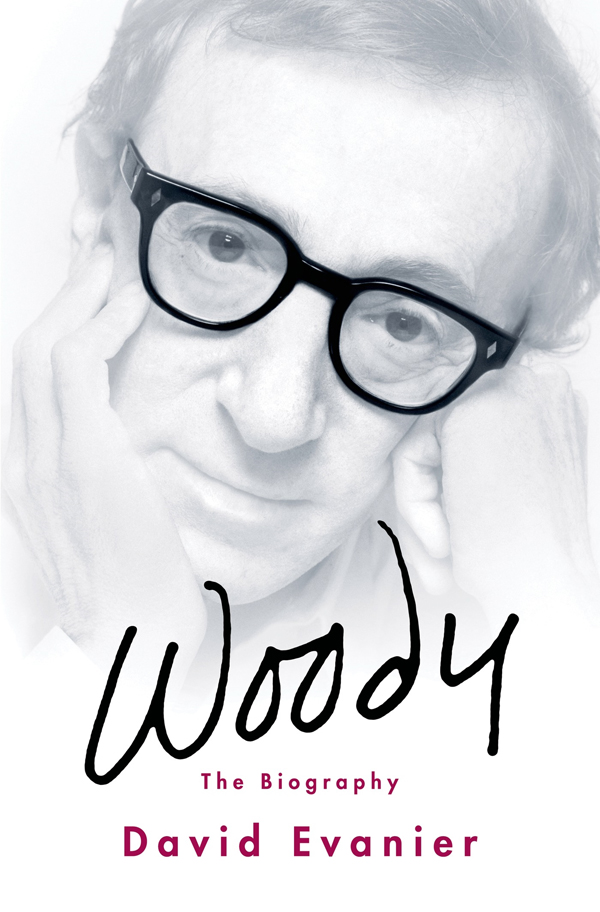Contents
Guide

The author and publisher have provided this e-book to you for your personal use only. You may not make this e-book publicly available in any way. Copyright infringement is against the law. If you believe the copy of this e-book you are reading infringes on the authors copyright, please notify the publisher at: us.macmillanusa.com/piracy.
To Dini Evanier, Andrew Blauner, Gary Terracino, and Mark Evanier
With deep appreciation to Javier Aguirresarobe, Harlene Rosen Allen, Peter Bart, Elizabeth Beier, Jennifer Belle, Dr. Maria Bergmann, Dr. Michael Bergmann, Walter Bernstein, Andrew Blauner, Donna Brodie, Brad Burgess, Frank Buxton, Dick Cavett, Jerome Chanes, Lynn Cohen, Stephen Dixon, Dr. Gerald Epstein, Dini Evanier, Mark Evanier, Elaine Evans, Linda Fairstein, Michael Fiorito, Eva Fogelman, Jason Fraley, Dorothy Friedman, Vincent Giordano, Shelly Goldstein, Elliott Gould, Charles Graeber, Robert Greenwald, Eamon Hickey, J. Hoberman, Ilana Howe, Annette Insdorf, Neal Jesuele, Carol Joffe, Jerome Kogan, Andrew Krents, Judith Liss, Phillip Lopate, George Lore, David Lowe, Judith Malina, Ric Menello, Marilyn Michaels, Elliott Mills, Barry Mitchell, Theodore Mitrani, Craig Modderno, Micah Morrison, Bill Mullins, Mel Neuhaus, Diane OLeary, Eric Pleskow, Norman Podhoretz, Craig Pomranz, Richard Powers, Tim Pratt, Dorothy Rabinowitz, Hugh Raffles, Kathleen Rogers, Francesca Rollins, Hillary Rollins, Jack Rollins, Susan Rollins, Cynthia Sayer, Jimmy Scalia, Richard Schickel, Stephen Schrader, John Simon, Sharon Simpson, Steve Stoliar, Heather Stone, Howard Storm, Juliet Taylor, Gary Terracino, Vicky Tiel, Lennie Triola, Paul Ventura, Jack Victor, Jeff Weatherford, Sid Weedman, Robert Weide, Alan Zweibel.
Special thanks to the brilliant executive director of the Writers Room, Donna Brodie.
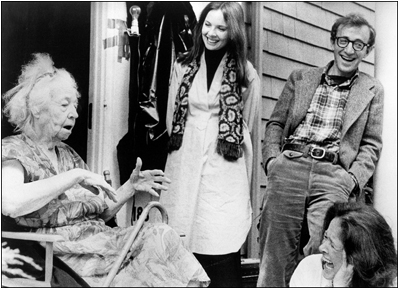
I RANG HIS DOORBELL.
Id been told by a friend of his that he never looked at his mail. Whether that was true or not, I wanted to be sure he knew I was writing a biography of him and that I had some questions for him. So I wrote him a letter and took it to his house.
A pleasant-looking fellow peered down and checked me out from an upper story. I have a letter for Mr. Allen, I said. Hold on, he said, and a moment later opened the door. He smiled, took the letter from my hand, and said, Perfect.
I was in. Well, not really. I got to Allen and I didnt get to him.
In my letter I had introduced myself and told Allen that I had already interviewed Jack Rollins, his longtime manager; as well as the film critics John Simon, Annette Insdorf, and Richard Schickel; the former banjoist in his band, Cynthia Sayer; and Sid Weedman, who had seen Woody in his early days when he wrote and performed at the Tamiment resort in the Poconos. I also said that I considered Crimes and Misdemeanors and Zelig to be his masterpieces.
I received an e-mail from Woody the following day. (He allegedly does not use e-mail, so I assume he dictated his letter to his assistant, Gini.)
Since then I have had a limited back-and-forth correspondence with Allen. He has picked the questions he chooses to answer, but he has been unfailingly courteous.
After writing five biographies I have learned at least one essential thing: The iconic image for which we know such a figure has little to do with what he or she actually is. No one has struggled with the problem of being really known more than Woody Allen, whose public persona is instantly and eternally assumed to be his real personality. I will never forget undertaking the biography of Tony Bennett, the sweetest and most lovable of personalities, and being told by Lennie Triola, a New York concert producer and music manager, Theres an ogre behind that door. True or not, I gave that observation a lot of thought. Woody Allen has compounded the problem by being the most confessional of writers-directors-actors, borrowing from his life in so many of his films while insisting that although a few details might be true, he has exaggerated and embellished most of it. He is also the only comedian in Hollywood history to insert the same unchanging comedic persona into every genre of filmmakingcomedy, romantic comedy, satire, dramaand yet have it effectively blend in. It is always the same character/persona. No one else has ever succeeded at this. It is remarkable, and it makes him liminal.
Groucho was always Groucho, doing Groucho stand-up within a film. Jack Benny was always Jack Benny, doing Benny stand-up. Every Bob Hope film is built around Hopes comedic shtick. According to the screenwriter-director Gary Terracino, Todays comedians (Will Ferrell, Adam Sandler) go in the other direction. They give us their tried-and-true comedic shtick within comedies, but ditch that persona altogether in dramas to demonstrate that they are real actors.
Woody is Woody in all of his films, he is the same unchanging comic persona, yet each film works in its own way. Unlike Groucho, Bob Hope, and Jack Benny, in addition to being an actor Allen was also a writer and director. He knew exactly how his persona could blend in. Zelig can be seen as a sly commentary on his own career and acting.
Allen has carved out exactly what he wants to do and has total control of his films. I have control of everything, and I mean everything, he told John Lahr. I can make any film I want to make. Any subjectcomic, serious. I can cast who I want to cast. I can reshoot anything I want to as long as I stay in the budget. I control the ads, the trailers, the music. Lahr asked him what would happen if he wasnt able to completely control his films. Id be gone, he said. There is no doubt that he meant it.
As an artist, Allen was never tempted to sell out or to try to outdo himself; nor did he care to ingratiate himself with the powers that be. He cares only to express himself without apology. He has managed to be current without being trendy and to be a genuine artist who almost always embraces classic storytelling over cerebration and abstraction.
He is the most amazing phenomenon in the history of American show business. John Ford, William Wyler, Charles Chaplin, all had a major output. No one has covered the gamut as Allen has, from downright laugh-aloud funny to poignantly, startlingly moving.
Sometimes it seems as if Allen has explored every shade of longing in Western man, Kent Jones wrote in Film Comment , for deliverance from the disappointments of the present, for transport to another more fulfilling realm, for solace from the drudgeries of shared existence, for recovery of the past, for consummation of love, for a little bit of luck.
Only Chaplin comes close, Gary Terracino said, and Chaplin, too, endures. He also had an astounding almost thirty-year run of global popularity. But even Chaplin ditched the Tramp in later years, only to see his popularity wane. Woody never ditches Woody.
Allen, like Chaplin, was self-educated, reclusive, melancholy and meticulous, wrote John Lahr. Both are comic geniuses who give life without actually loving it.
Allen defined the difference between Chaplins screen persona and his own in his interview with Lahr. I came along after Freud, he said, when the playing field had shifted to the psyche. It was interior. What was interesting to people suddenly was the psyche. They wanted to know what was going on in the mind.


